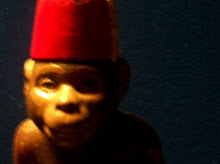 Some good Halloween reading:
Some good Halloween reading:Over at National Review there's a nice piece on the Met's exhibit The Perfect Medium: Photography and the Occult.
The immaterial had been made material, and in a supposedly more skeptical age, that's what counted. In great part, the enormous popularity of spiritualism in the later 19th century was a response to the threat that science increasingly represented to the certainties of traditional belief. Science had made Doubting Thomases of many, but spiritualism, by purportedly offering definitive proof of an afterlife, enabled its followers to reconcile ancestral faith and eternal superstitions with, they thought, fashionable modernity and the rigors of scientific analysis.I appreciate that last sentiment in particular, and I don't have to take a backseat to anyone when it comes to being a skeptical curmudgeon, but I cannot deny that part of me thinks snake churches, suburban shamans, and mainstreet psychics are fun in a sideshow kind of way and of considerable interest in a much less fun academic kind of way.
That the science was junk, and the evidence bunk, did not, in the end, matter very much. What counted was that old superstitions had been given a new veneer, and, if that veneer soon warped into a bizarre creed all its own, that's something that ought not to surprise anyone familiar with the nonsense in which mankind has long been prepared to believe — and still is. Any visitor to "The Perfect Medium" tempted to feel superior to the credulous old fogies now making fools of themselves on the walls of the Met should take another look at the metaphysical shambles that surrounds him in our modern America of snake churches, suburban shamans, mainstreet psychics, psychic detectives, pet psychics, psychic hotlines, spirit guides, movie-star scientology, alien abductions, celebrity Kabbalah, Crossing Over, Ghost Hunters, Shirley Maclaine, resentful Wiccans, preachy pagans, and (though I know this won’t be entirely welcome) don't even get me started on Intelligent Design.
Also at NR, conservatives try to grasp the appeal of Wicca. Really. Kind of amusing.
Their beliefs are very postmodern — what they believe can be tweaked for each practitioner. They do not believe in absolute good or evil and don't really seem to care about the history of their religion — only the experiences they gain from it.The author is correct to point out that Wicca, like much that falls under the heading of "new age," is solipsistic and increasingly commercialized. She comes off as being fair and even-handed in claiming that Wicca fulfills a spiritual yearning for young women, but is herself convinced that Christianity, when practiced correctly, can do a better job of satisfying that need.
And finally, in the L.A. Times, Mary Roach, author of Spook: Science Tackles the Afterlife, wonders why the supposed speech of the dead is so...inane:
HERE'S MY BEEF with the dead — you'd think they'd be bursting to talk about all the things us not-yet-dead are madly curious about. Such as: Hey, where are you now? What do you do all day? What's it feel like being dead? Can you see me? Even when I'm on the toilet? Would you cut that out?Sounds reasonable to me. I'm not quite half that old and I already babble incoherently. Happy Halloween Tricksters.
But in medium-brokered exchanges, if the dead come through at all, they come through in cryptic little impressions: a stout woman, a small black dog, the date May 23. When they talk in the background on tape recordings or over the radio — and there are thousands of people who believe that the garbled, echoey words and whispers they can make out on tape or over the airwaves are coming from the Beyond — they say things like "bird songs at night" or "please interrupt" or "industrious!" It's a maddening way to communicate.
Based on such reports, ghosts strike me as quite senile, which I suppose is par for the course when you've been around 200 or 300 years.


